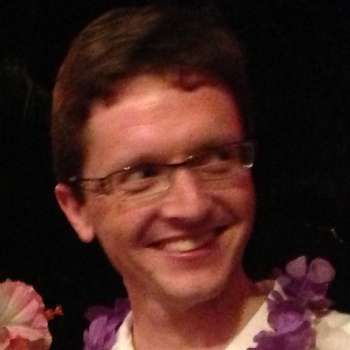The orientalisms in Puccini's operas sit uneasily with today's values, which might explain why the Deutsche Oper's current production of Turandot swapped Peking in legendary times for something vaguely mid-20th century, by the look of the costumes. The Chinese elements were reduced visually to some concerted fanning from the chorus (at one point, this amounted to an additional percussion effect), although Puccini's score kept insisting on the original provenance. Imperial tyranny was replaced by a more anonymous totalitarian state where control was exerted by goons and search-lights.
The stage set-up in Acts I and II was (conceptually, if not literally) a mirror-image of the auditorium stalls, with the chorus seated in rows looking outwards. At one point, a spotlight wandered among the audience (giving me a new respect for the singers who have to face into this blinding light without wincing), before cowing the boisterousness of the chorus. On the apron between real and 'stage' audiences was a raised narrow strip on which the riddles and other in-story spectacles took place. This strip was sometimes separated off by means of a scrim which, depending on the lighting, could be opaque or translucent. High on the back wall was a large window-like aperture, opening onto a small room decorated with tasteless flock wallpaper from which the Emperor and his functionaries looked down on the riddle scene.
So far, so interesting; however, this division of the stage came at a big price. It quickly became apparent that there was a major difference in audibility between those singing downstage, and those further back. Of the principals in Act I, only the impressive Simon Lim (Timur) carried without obvious effort; Kamen Chanev (Calaf) in particular seemed to be forcing to the point of hoarseness. The orchestra under Ivan Repušić did not do the performers any favours by playing with such gusto that more than a few sung passages were rendered completely inaudible. The soloists were not the only ones to suffer – some quieter off-stage choral moments were also drowned out.
Act III began with a bang – the central section of the huge back wall fell forward, exposing the multi-level ladder platform by which the performers had reached the upper room earlier. Exposing the inner workings of the theatre is not uncommon in productions nowadays, but there was little obvious pay-off here. Chanev sang the famous “Nessun dorma” at the footlights, almost as if it were a concert aria; meanwhile, mysterious film footage of children waking and walking in vaguely gothic settings was projected onto the scrim. This wasn't the only baffling detail of the staging: another was the intrusion of dancing couples in formal evening wear just before the first act curtain.
The ending is famously problematic: for one thing, the opera remained incomplete on Puccini's death and was patched together by Franco Alfano. But the deeper problem is a dramaturgical one: how to make us care about the burgeoning love between the icy, murderous Turandot and the besotted Calaf, when we have seen the most sympathetic character, Liù, become a pawn in their mind-games, tortured to the point of taking her own life. The director, Lorenzo Fioroni, decided that these characters are unredeemable egomaniacs who become monsters. This only showed itself in the business after Turandot has sung her final line, when (in the most outrageous of directorial interventions) she killed the emperor, her father. Calaf then took the knife and committed patricide as the chorus (kept off-stage here) sings to the Glory of the Sun. As the curtain went down, I can't have been alone in being astonished!
Chanev improved as the evening went on, although never transforming the admittedly one-dimensional Calaf into something one could identify with. Catherine Foster was something of a disappointment as Turandot. Unquestionably she had the big, ringing voice needed, but too often her pitching was approximate, especially in Act II. My pick of the singers on the night was Heidi Stober as Liù: she captured the warmth of the character, and had some lovely floated top B flats. Peter Maus was adequate as the emperor.
Melih Tepretmez (Ping), Gideon Poppe (Pang) and Matthew Newlin (Pong) were good in those sections where the staging and orchestra allowed them to be audible. They first appeared as entertainment for the crowds, enacting in silent parody the roles of Turandot, her earlier suitor the doomed Prince of Persia, and executioner. Their major scene in Act II culminated in a comic multiple suicide attempt, foiled by their not being able to get their three heads through the single noose. More accidentally comic was the trouble Chanev had arranging the big meringue wedding dress for Foster to step into during their big Act III duet; the giggles in the seats surrounding me confirmed that the tension of the moment had entirely dissipated.


